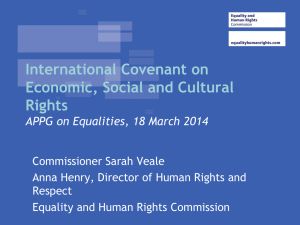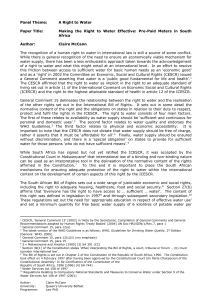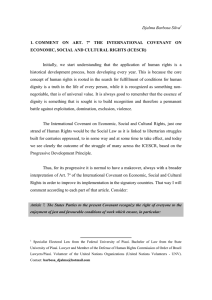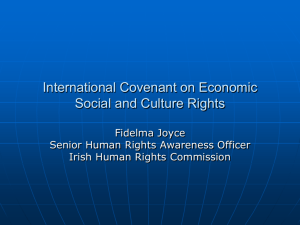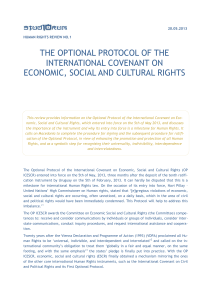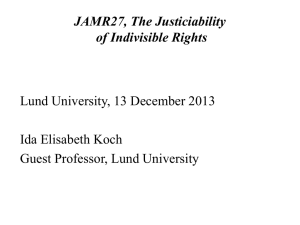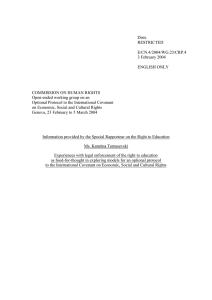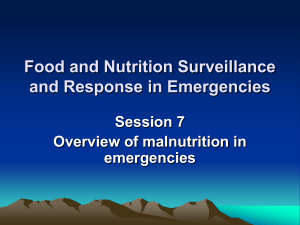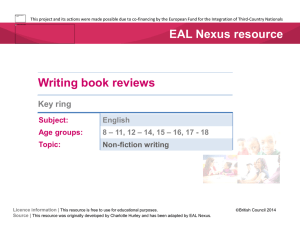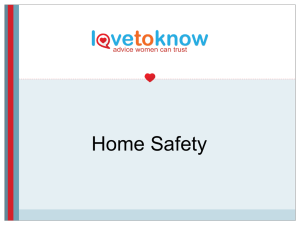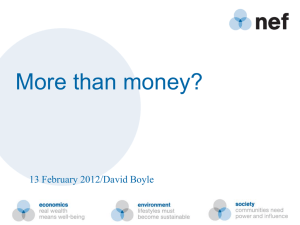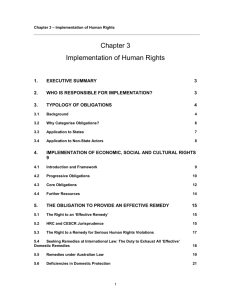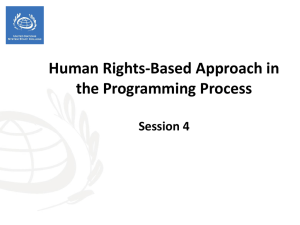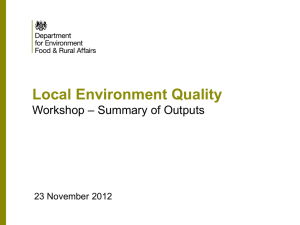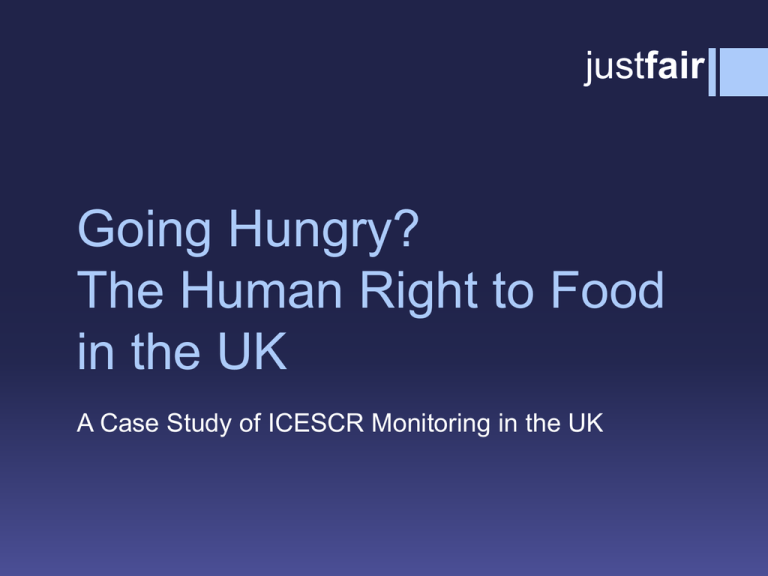
justfair
Going Hungry?
The Human Right to Food
in the UK
A Case Study of ICESCR Monitoring in the UK
justfair
Article 11(1) ICESCR
… recognises the right of everyone to an adequate
standard of living, including adequate food,
clothing and housing, and to the continuous
improvement of living conditions.
Article 11(2) guarantees the fundamental right of
everyone to be free from hunger
justfair
UK Right to Food Obligations
The UK has signed and ratified, and is therefore
legally bound by, the ICESCR.
The UK reports to the CESCR on a five yearly
basis regarding implementation of the ICESCR,
including the right to food, in the UK.
The UK Government will submit the state report for
the sixth CESCR periodic review in June 2014,
with the last review having taken place in 2009.
justfair
Human Right to Adequate,
Accessible and Available Food
According to the UN Committee on
Economic, Social and Cultural Rights
(CESCR), Article 11 ICESCR guarantees
the right to adequate, accessible and
available food.
justfair
Human Right to Adequate
Food
justfair
Human Right to Adequate Food
Adequacy: food must satisfy dietary needs, taking
into account the individual’s age, living conditions,
health, occupation, sex, etc.
justfair
Positive Steps
The Government have introduced policies
to tackle modern malnutrition and obesity:
Free school meals plan,
‘Healthy Lives, Healthy People' action plan on
obesity,
Improved food labelling and new guidance on
physical activity
justfair
From 2007 to 2012, expenditure on food in the UK rose
by 19.9%, but the actual volume of food consumed
declined by 7.3%
(Centre for Economics and Business Research, 2013)
justfair
Average calorie density of households’ purchases increased
by 4.8%, on average, between 2005–07 and 2010–12
(Institute for Fiscal Studies, 2013)
justfair
Number of malnutrition related admissions to
hospital in England has increased by 74% since
2008-09, in correlation with food bank usage
(British Medical Journal, 2013)
justfair
Human Right to Adequate Food
CONCLUSION: Available evidence highlights a worrying
trend of backward steps (i.e. retrogression) with regard to the
right to adequate food
RECOMMENDATION: Review and revise policies for
tackling malnutrition, taking into account the correlation
between rising food bank usage and increased malnutrition
related hospital admissions.
justfair
Human Right to
Accessible Food
justfair
Human Right to Accessible Food
Economic accessibility: food must be affordable.
Individuals should be able to afford food for an
adequate diet without compromising on any other
basic needs, such as school fees, medicines or
rent.
Positive Steps
March 2014, raise minimum wage to £6.50 per
hour (and call for £7) to tackle ´cost of living crisis´
Sept’ to November 2013, the percentage of people
in work reached 72.1%, up by 450,000 a year
earlier
justfair
Real wage growth averaged 2.9% in the 1970s and
1980s, 1.5% in the 1990s, 1.2% in 2000s, but has
fallen to minus 2.2% since the first quarter of 2010
(Labour Market Survey, 2013)
justfair
Food prices have risen by 22% in the UK
between January 2007 and May 2013
(Joseph Rowntree Foundation, 2013)
justfair
Fall in Real Food Expenditure
(Institute for Fiscal Studies, 2013)
Trussell Trust food voucher
distribution by type of crisis –
18.45% due to low income
(Trussell Trust, 2013)
justfair
justfair
170% Rise in Food bank Usage
(Trussell Trust, 2013)
justfair
UN Special Rapporteur on the
Right to Food (The Guardian, 2013)
“... Food banks should not be seen as a "normal" part of
national safety nets … Food banks depend on donations,
and they are often run by volunteers: they are charity-based,
not rights-based, and they should not be seen as a substitute
for the robust social safety nets to which each individual has
a right.”
justfair
DEFRA “Household Food Security
in the UK: A Review of Food Aid”
(DEFRA, 2014)
While "food aid may provide immediate relief for household
members ... [it] has a limited impact on overall household
food security status", and "is not able to address and
overcome wider determinants (root causes) of household
food insecurity."
justfair
Right to Accesible Food
CONCLUSION: While the Department for Work
and Pensions policy of food bank ´signposting´
may help to provide immediate relief against
hunger, by providing a minimum package of
calories, proteins and other specific nutrients, it
fails to achieve progressively the full realisation of
the right to adequate food
Right to Accesible Food
justfair
1. RECOMMENDATION: While taking into account
the rising costs of living, including food, fuel and
housing prices, investigate whether incomes are
inadequate to guarantee the right to food for all.
2. RECOMMENDATION: Take immediate steps to
ensure that food banks are not used as a
substitute for a comprehensive social security
system administered by the state.
justfair
National Human Right to
Food Strategy
justfair
Human Right to Food Strategy
CONCLUSION: Individual right to food-related policies,
such as the free schools meals plan, though
progressive in their own right, cannot guarantee the
right to adequate food for everyone in the UK, unless
they are connected through an overarching national
rights-based food strategy.
justfair
Human Right to Food Strategy
RECOMMENDATION Formulate a national right to food
strategy and action plan, which incorporates indicators,
benchmarks and time-bound targets. This strategy
should include the following:
Urgent assessment of the state of enjoyment of the right to
food in the UK;
Monitoring of DWP ´sign-posting´ to food banks;
Right to food impact assessments for all new legislation.

